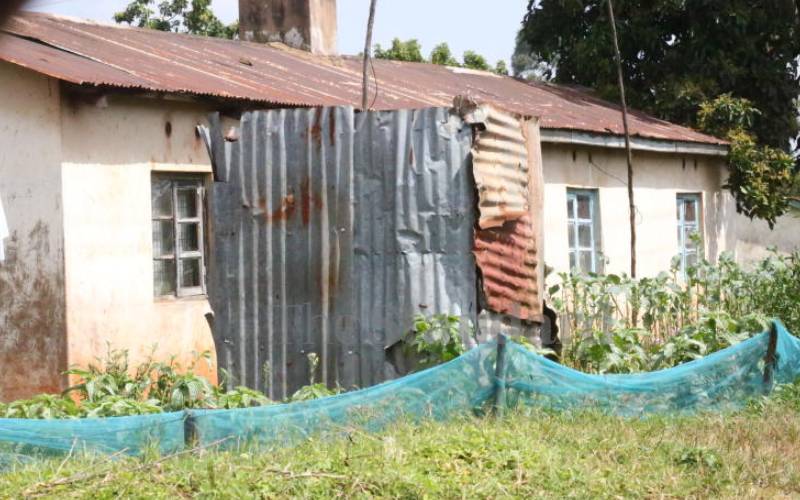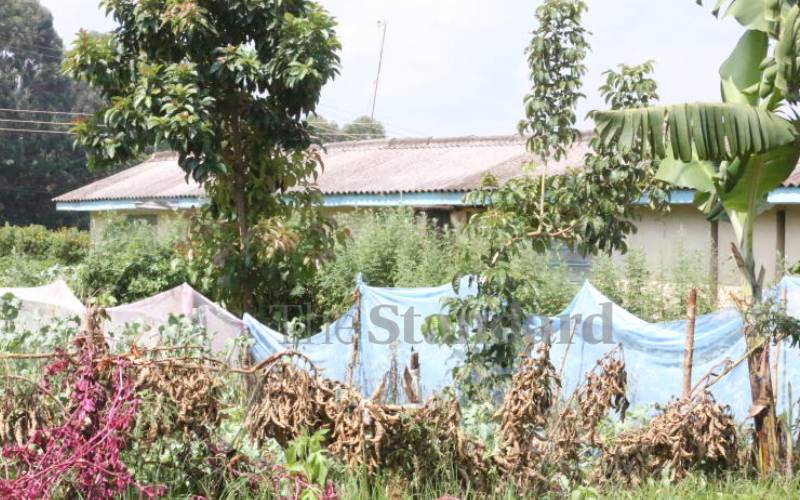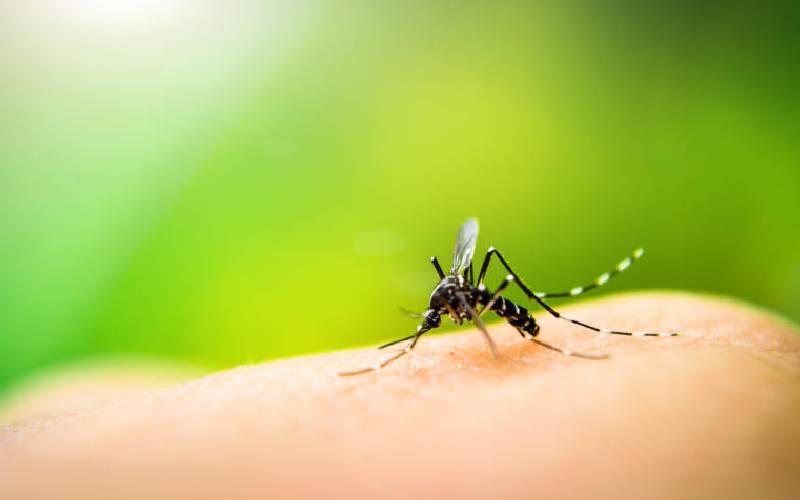
World-beating marathoner Eliud Kipchoge - now Malaria Ambassador - once missed a crucial race after being spiked by malaria while training at Kasarani stadium.
This happened as when the double Olympic champion started his career in sports and qualified for the world junior championships. “It was my first race outside Kenya, but I couldn’t go because of malaria. I thought that was the end of my trips,” he says.
Mr Kipchoge was treated and cleared to race after a week. “People are taking malaria as flu, which is wrong. Malaria can kill,” says the first athlete to run a marathon sub-two hours.
In Africa, about one child dies every minute, ranking malaria as one of the top three killer diseases. Mr Kipchoge’s dream is to one day wake up to hear malaria is no more. “I want us to have a free malaria country, zero malaria in Africa. If we end malaria, we can focus on other better things,” he says.
He is not the only athlete whose career was almost disrupted by malaria.
Ms Faith Kipyegon, another double world and Olympic champion, and also a malaria ambassador, recalls a time she could not train following a malaria. “Luckily, it was not severe and it was treated. But it harmpered my training efforts. People take malaria as a normal disease, but it is not. It can kill,” she said.
Ms Kipyegon is now championing zero malaria cases to ease the burden and reduce pregnant women’s risk of losing children to the disease, as the world marks this year’s Malaria Day today.
Ms Kipyegon, a mother of a three-year-old child, wants women to embrace precautionary measures, including sleeping under mosquito nets as well as vaccination of children under five. But there is another challenge. A visit to one Ms Brigid Akinyi Wabwire, a mother of four, living in Buhuma village in Busia, reveals a worrying trend. She has fenced her sukumawiki garden using mosquito nets, “to keep off poultry”.
This Ms Akinyi does despite acknowledging that her third-born is prone to malaria infections, Busia also being a malaria-endemic county.
Last year in November, her son tested positive for malaria. Her other children had to go hungry while she nursed him in hospital.

“For my younger child, whenever it starts getting dark they have to wear long-sleeved clothes to avoid mosquito bites and hospital admissions,” says Akinyi, whose other challenge is shouldering the high cost of malaria treatment. “Most of the time I don’t have transport to hospital, and the Community Health Volunteer (GHV) has no medicine to offer,” she says, adding: “We have to buy drugs over the counter as hospitals are far.”
10 patients daily
Ms Jacinta Rabura, a CHV in Buhuma village, says she handles at least 10 malaria patients daily. “Sometimes I get severe cases that I refer, but teaching about clearing bushes and draining stagnant water has helped reduce cases in this area,” she says.
Mr Jonathan Ino, Chief Officer, Health and Sanitation in Busia County, says malaria remains the highest cause of morbidity and mortality. “The prevalence rate is 38.5 per cent, meaning out of 100 people almost 40 are affected directly or indirectly by malaria in Busia,” he says.
Busia is one of the top 10 malaria endemic counties. Almost 40 per cent of the population visiting health facilities test positive for malaria. “Two per cent of mortality cases are caused by malaria burden,” says Mr Ino.
Busia is near lake Victoria, making it prone to floods and stagnant water bodies, which become breeding sites for mosquitoes.
Reduced use of mosquito nets keeps malaria cases high despite the efficacy of treated nets and distribution being 100 per cent.
Last year the county distributed 630,000 bed nets in all households, according to Mr Ino, who blames limited uptake on “some myths and misconceptions”. One of the myths locally is that mosquito nets attract bedbugs.
Long-lasting insecticide
“People don’t know nets are treated by the long-lasting insecticide, and if you put them in an environment where bed bugs are, they will be forced to come out. So the nets do not bring bedbugs but chase them away,” explains Mr Ino.
He laments that some residents also use nets to keep ants away, while some men say the nets make them sweat at night.
The CHVs currently use the malaria vaccine in Busia, besides implementing early malaria detection using rapid testing kits.
Ino says: “We are also advising communities to do indoor residual spraying, a costly venture that we are not able to do as a county right now.”
Mr Kipchoge says malaria can easily be detected and treated “if people sleep under-protected mosquito nets and rush to health centers when ill”.
Public awareness, he says, is key to the disease’s eventual elimination, with a 95 per cent reductin in prevalence.
The other challenge curtailing the fight against malaria is the cross-border movements between Kenya and Uganda.
“But since it is hard to stop social interactions, the strategic plan being mooted will ensure what is done in Kenya to fight malaria is also done in neighbouring countries,” says Mr Ino.

Dr George Githuka, the Division Head, National Malaria Programme in the Ministry of Health, says great strides have been made considering the 2021 Malaria Indicator Survey shows prevalence in Kenya as having decreased from 8 per cent in 2015 to 5.6 per cent in 2020.
“We had targeted to reduce malaria incidents and deaths by 75 per cent by 2023. So we need to accelerate our efforts to eradicate it by 2030,” says Dr Githuka.
He believes malaria will be eliminated through partnerships like launch of the Malaria Council for mobilising resources.
Mr Christopher Gitonga, the End Malaria Council chairperson argues that money will be raised from the private sector to help the Ministry of Health bridge the budget gap. “It is around $240 million (Sh27 billion) every year… our other mandate as a council is to push advocacy for malaria,” he says.
Dr Githuka said county governments will be instrumental in advocacy and also in sensitising communities. “We have started with low burden counties in Central Kenya like Kirinyaga and Nyeri, where malaria can easily be eliminated,” he said.
He, however, said the Covid-19 pandemic affected the milestones gained. The pandemic not only disrupted the mass distribution of mosquito nets but also saw a decline in hospital attendance, as many opted to buy medicine over the counter withou proper diagnosis, which can lead to resistance, according to the medic.
Dr Githuka said a lot would also be discerned from the ongoing malaria vaccine project piloted in eight endemic counties in selected sub-counties where it is being integrated with all other childhood vaccinations.
The integration, he explained, “is to find out whether the malaria vaccine will disrupt the uptake of other vaccines or it will integrate seamlessly; and whether it will change the health-seeking behaviour of women with children who have been vaccinated against malaria.”
Malaria prevention, however, is also possible, considering that about 50 per cent of households have at least one treated net with a higher number of women and children sleeping under them.
Anopheles mosquito
The downside are the reported cases of resistance against insecticides by the anopheles mosquito, which could reverse gains made. “A lot of mitigation needs to be put in place to ensure we are not overtaken by this resistance,” said Dr Githuka.
Malaria is more than a health issue. Beside being the leading cause of loss of pregnancies, low birth weight among infants and childhood and maternal mortality rates, the disease keeps children out of school, affecting their potential, according to Ms Lillies Njaga, the African Director of Malaria No More.
Malaria also causes economic sabotage by keeping people away from their economic activities. It also strains healthcare facilities as it is the second cause of hospital attendance after respiratory diseases.
Dr Willis Akhwale, the senior advisor at The African Leaders Malaria Alliance, says 34 counties in Kenya have a prevalence rate of less than 1 per cent, which is progressive.
“It means fewer children will die and we will be saving lives more, and the country will digitise malaria data to make it more accessible,” says Dr Akwale.
 The Standard Group Plc is a multi-media organization with investments in media
platforms spanning newspaper print
operations, television, radio broadcasting, digital and online services. The
Standard Group is recognized as a
leading multi-media house in Kenya with a key influence in matters of national
and international interest.
The Standard Group Plc is a multi-media organization with investments in media
platforms spanning newspaper print
operations, television, radio broadcasting, digital and online services. The
Standard Group is recognized as a
leading multi-media house in Kenya with a key influence in matters of national
and international interest.











